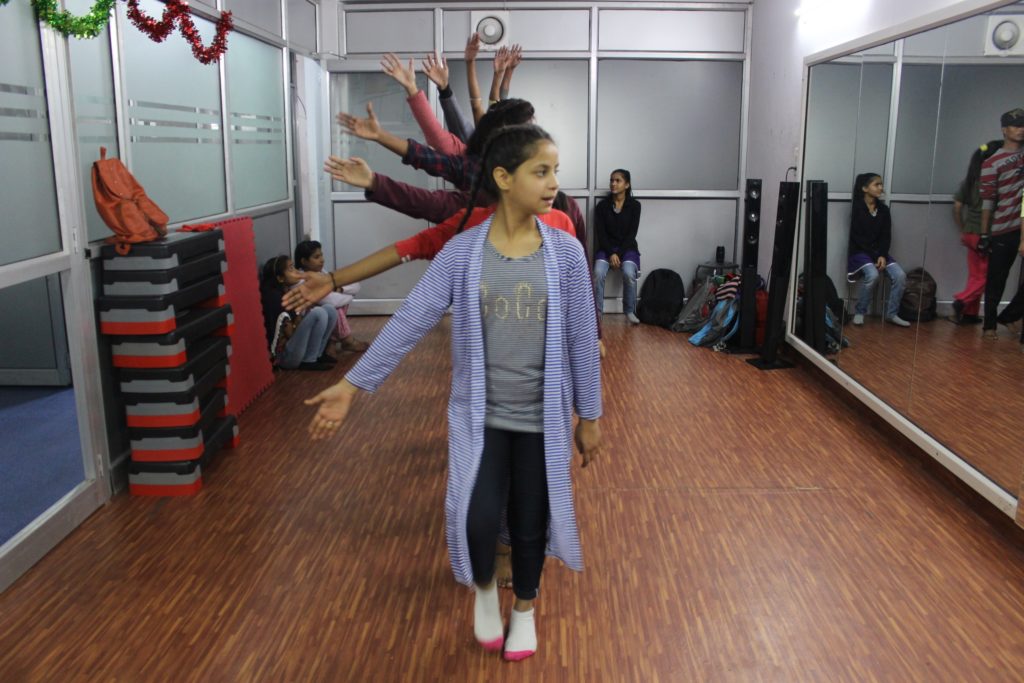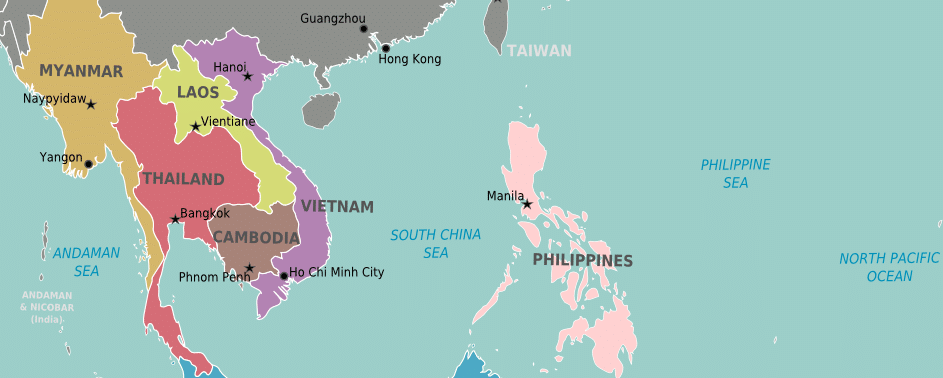CSEI’s Promoting Social Equity and Inclusion for Youth in India
Click here to read the most recent update on the work of CSEI related to COVID-19
The Center for Social Equity and Inclusion (CSEI) exists to deepen democracy and to develop a robust, inclusive society in India by enhancing the involvement of communities that are excluded. CSEI formed in 2009, growing out of three decades of volunteers working on rights-based development with a focus on community organizing, networking, research, and forming campaigns. Today, working with young people from socially excluded communities has emerged as a priority for CSEI in their work toward a just and inclusive society in India.
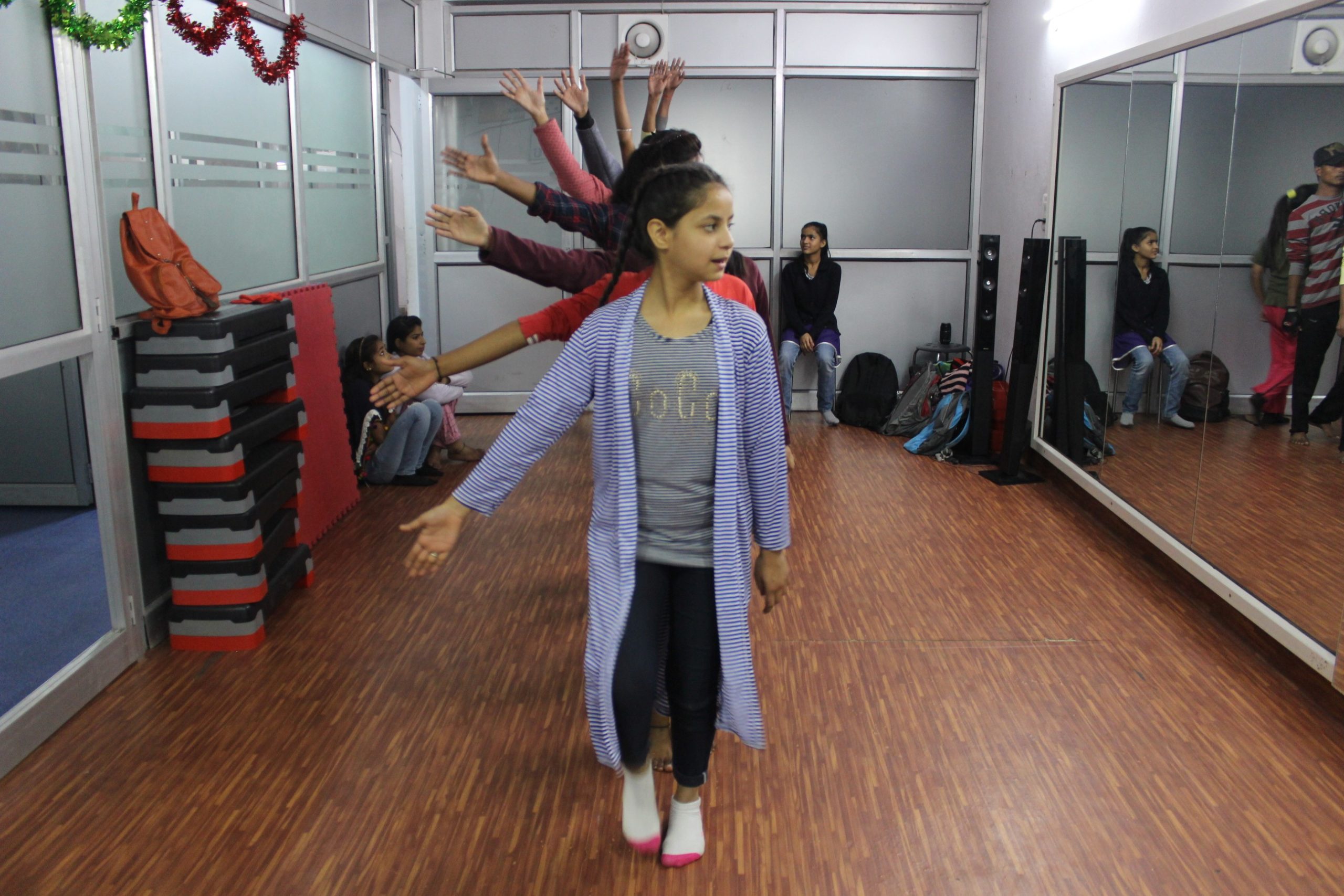 It is estimated that India has the highest youth population in the world with 356 million people between the ages of 10-24 years old. Of this population, more than half of these young people belong to the Dalit, Tribal, Muslim or other marginalized communities. Because of this, they face specific disadvantages for their personal development, as well as for their participation in the wider society.
It is estimated that India has the highest youth population in the world with 356 million people between the ages of 10-24 years old. Of this population, more than half of these young people belong to the Dalit, Tribal, Muslim or other marginalized communities. Because of this, they face specific disadvantages for their personal development, as well as for their participation in the wider society.
CSEI evolved four distinct pillars, or emphases, to guide their work with marginalized young people.
- Leadership and life-skills building
- Career and livelihood promotion
- New social enterprises
- Empowering inclusive communities
Today, CSEI empowers community led organizations (CLOs) in over 50 Dalit, Tribal, and Muslim communities located in the six states of Bihar, Delhi, Uttar Pradesh, Jharkhand, Odisha, and Chattisgarh. Through programming for young people, CSEI is working to provide personal leadership and life-skills development as well as to develop their community engagement. One CSEI program, Youth Hubs, provides facilitated and safe spaces for young girls and boys to exchange ideas and plan community actions.
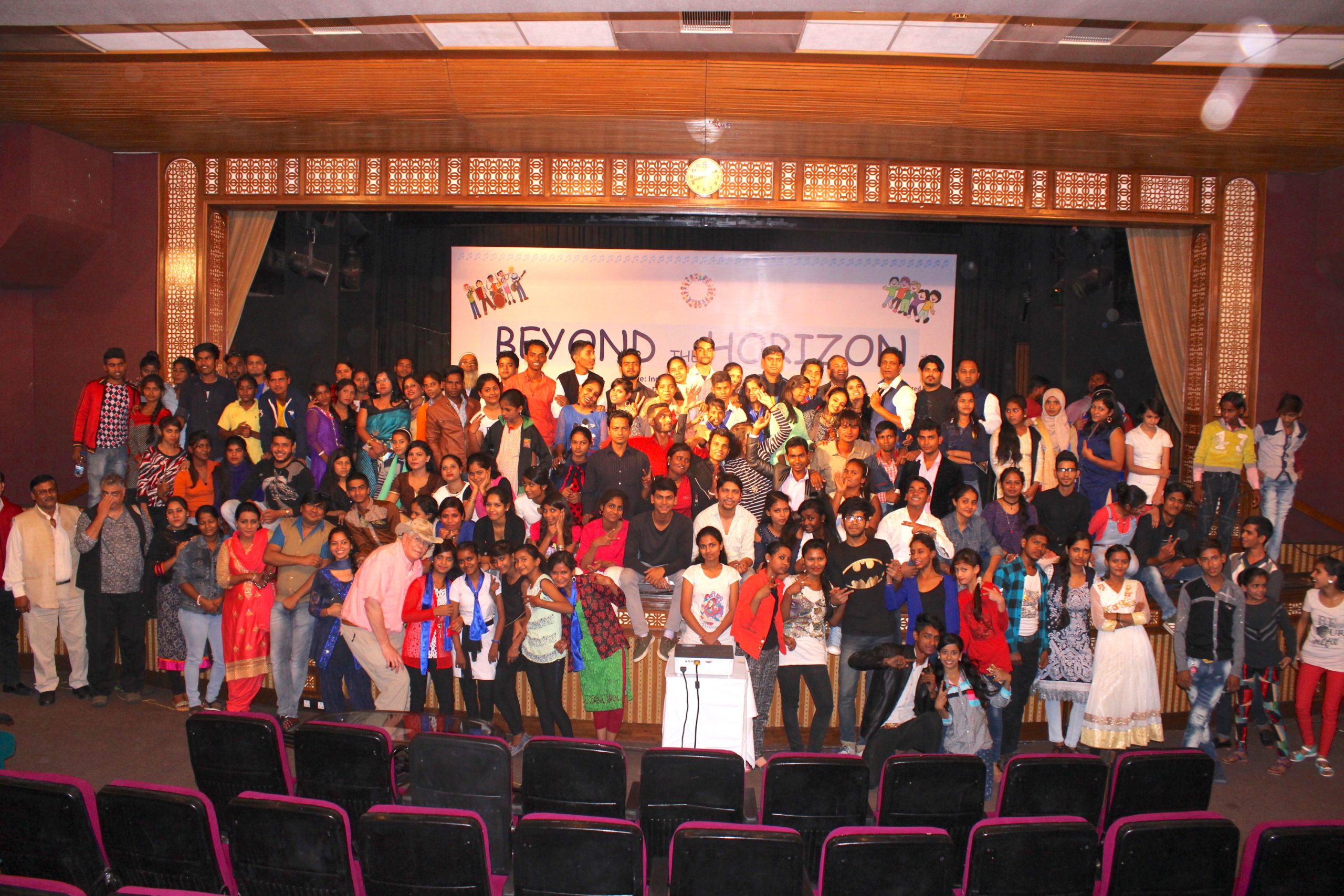 A second youth program is the Leadership-building training courses. These courses provide opportunities for teens and young adults to engage in peace-building activities, learn about internships, and exposure programs directed for their personality and strengths. Through CSEI, young people have the opportunity to participate in many different community action programs where they can share new information, access state provisions, ensure children have opportunities to attend school, raise community issues, and address human rights violations. Constitutional knowledge, human rights awareness, and gender sensitivity are common topics addressed in training materials as well as through peer education. CSEI also facilitates the connection between individuals and other human rights forums and networks – such as those working specifically with Dalit rights, right to education, forest rights, right to information, gender rights, and UN Sustainable Development Goals forums at the state and national levels. In addition, the youth have built a forum of their own called the National Youth Equity Forum (NYEF), as well as newly formed state forums.
A second youth program is the Leadership-building training courses. These courses provide opportunities for teens and young adults to engage in peace-building activities, learn about internships, and exposure programs directed for their personality and strengths. Through CSEI, young people have the opportunity to participate in many different community action programs where they can share new information, access state provisions, ensure children have opportunities to attend school, raise community issues, and address human rights violations. Constitutional knowledge, human rights awareness, and gender sensitivity are common topics addressed in training materials as well as through peer education. CSEI also facilitates the connection between individuals and other human rights forums and networks – such as those working specifically with Dalit rights, right to education, forest rights, right to information, gender rights, and UN Sustainable Development Goals forums at the state and national levels. In addition, the youth have built a forum of their own called the National Youth Equity Forum (NYEF), as well as newly formed state forums.
In order to help young people from marginalized communities navigate higher education and find college mentors, CSEI has created the Higher Education Link Program (HELP). CSEI provides teens interested in higher education with short-term and long-term fellowship opportunities ranging between six months and two years in order to pursue higher education degrees and career opportunities. One component of the fellowship program is that individuals actively participate in developing their own communities. Global Ministries continues to welcome gifts for the work of the Center for Social Equity and Inclusion for their work to empower youth from socially excluded communities.
Update: April 2020
 The spread of the COVID-19 pandemic is a major health and social reality affecting all of God’s children around the world. Many additional complicating issues are present and negatively impacting marginalized and socially excluded populations. CSEI identifies one such issue in India as the national lockdown which immediately means families have lost their income sources as informal employment positions are no longer available. Millions of migrant workers have been obliged to walk hundreds of miles back to their home villages from larger cities as transportation has been shut down. Testing facilities are not available in most rural areas of the country where marginalized communities are living. While the government has announced some relief measures, it will take many weeks to begin this program, and many individuals do not have the official identification documents to access this relief.
The spread of the COVID-19 pandemic is a major health and social reality affecting all of God’s children around the world. Many additional complicating issues are present and negatively impacting marginalized and socially excluded populations. CSEI identifies one such issue in India as the national lockdown which immediately means families have lost their income sources as informal employment positions are no longer available. Millions of migrant workers have been obliged to walk hundreds of miles back to their home villages from larger cities as transportation has been shut down. Testing facilities are not available in most rural areas of the country where marginalized communities are living. While the government has announced some relief measures, it will take many weeks to begin this program, and many individuals do not have the official identification documents to access this relief.
 The CSEI, along with the National Youth Equity Forum (NYEF) in India, has started to provide support and relief for the marginalized communities, who are entering this unprecedented new reality. These efforts include offering immediate financial support for those who have been migrant workers and returning to their home villages, and offering packages of dry food items to the most vulnerable households first – single women, elderly, persons with disabilities, and women who are pregnant or with small children. Additionally, CSEI is sharing basic health and medical awareness on the spread of COVID-19 to rural communities, serving as liaison between government programs and Dalit families to receive additional food and cash benefits, and empowering young people to support their community. In the first week, CSEI has secured funding to provide 500 families with food packages and 100 families with financial assistance.
The CSEI, along with the National Youth Equity Forum (NYEF) in India, has started to provide support and relief for the marginalized communities, who are entering this unprecedented new reality. These efforts include offering immediate financial support for those who have been migrant workers and returning to their home villages, and offering packages of dry food items to the most vulnerable households first – single women, elderly, persons with disabilities, and women who are pregnant or with small children. Additionally, CSEI is sharing basic health and medical awareness on the spread of COVID-19 to rural communities, serving as liaison between government programs and Dalit families to receive additional food and cash benefits, and empowering young people to support their community. In the first week, CSEI has secured funding to provide 500 families with food packages and 100 families with financial assistance.
The CSEI continues to raise funds to provide relief packages of rice, flour, beans, oil, and spices for additional families, and to provide financial support for vulnerable families who have lost their income.
Update: May 2020
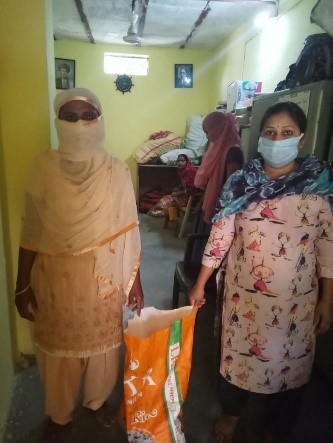 The Center for Social Equity and Inclusion (CSEI) exists to develop a robust, inclusive society in India by enhancing the involvement of communities that are excluded. CSEI formed in 2009, growing out of three decades of volunteers working on rights-based development with a focus on community organizing, networking, research, and forming campaigns. Beginning in late March, CSEI, along with the National Youth Equity Forum (NYEF) in India, have provided relief for the marginalized communities, who are entering this unprecedented new reality.
The Center for Social Equity and Inclusion (CSEI) exists to develop a robust, inclusive society in India by enhancing the involvement of communities that are excluded. CSEI formed in 2009, growing out of three decades of volunteers working on rights-based development with a focus on community organizing, networking, research, and forming campaigns. Beginning in late March, CSEI, along with the National Youth Equity Forum (NYEF) in India, have provided relief for the marginalized communities, who are entering this unprecedented new reality.
Volunteers of CSEI and NYEF identified over 1,500 of the most vulnerable families, who participate in programs of CSEI and NYEF, and who find work as janitors, laundry workers, domestic help, trash pickers, sewer workers, and brick makers. These families live in several communities across India, including the states of Bihar and Utter Pradesh, as well as the city of Delhi. Those who are considered “lucky” are continuing to work in many positions without protective equipment, and those who are considered “unlucky” have no work.
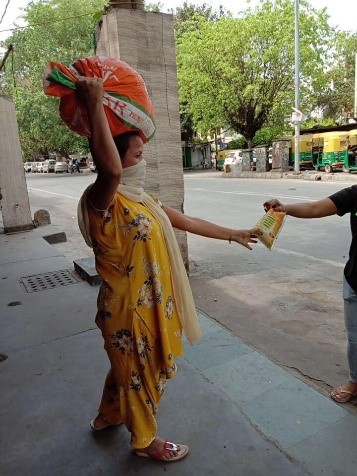 Through the response work of NYEF and CSEI, each family identified has received a kit containing:
Through the response work of NYEF and CSEI, each family identified has received a kit containing:
- Wheat Flour, (11 pounds)
- Rice, (11 pounds)
- Lentils or Beans, (4.5 pounds)
- Soybeans, (4.5 pounds)
- Edible Oil, (1 liter)
- Onion, (4.5 pounds)
- Spices
- Soap, (Two pieces)
CSEI continues to deliver relief kits to newly identified families and continue to support families of marginalized communities in India.
Update: June 2020
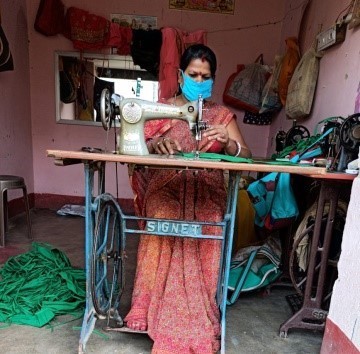 Wearing masks, keeping hygienic practices, and maintaining physical distances are the best ways to avoid the spread of COVID-19. In India, every state has made wearing masks in public required. The mask sales are taking place in all kinds of shops, and the cost of a mask varies greatly. CSEI decided on a two-fold strategy to address this challenge:
Wearing masks, keeping hygienic practices, and maintaining physical distances are the best ways to avoid the spread of COVID-19. In India, every state has made wearing masks in public required. The mask sales are taking place in all kinds of shops, and the cost of a mask varies greatly. CSEI decided on a two-fold strategy to address this challenge:
· Provide masks to marginalized and vulnerable communities at no cost
· Set up social enterprises led by Dalit and marginalized women, who are trained in sewing, to produce masks and could be sold in open markets at a reasonable price. This provides an income as well as opportunity for women to help others in the community with necessary masks
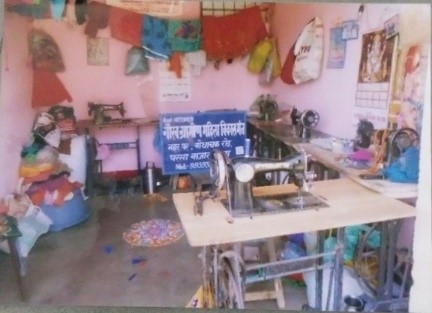 Currently, the CSEI is working with two groups of women sewing masks. One group is from Gaurav Gramin Mahila Vikas Manch (GGMVM), Patna. The current aim of the group is to produce 200 masks per day which could be sold in the open market. CSEI is working with women from the group and connecting them with a network of medical shops, local shops, and setting up a kiosk at each government Public Distribution System (PDS) shop is in planning.
Currently, the CSEI is working with two groups of women sewing masks. One group is from Gaurav Gramin Mahila Vikas Manch (GGMVM), Patna. The current aim of the group is to produce 200 masks per day which could be sold in the open market. CSEI is working with women from the group and connecting them with a network of medical shops, local shops, and setting up a kiosk at each government Public Distribution System (PDS) shop is in planning.
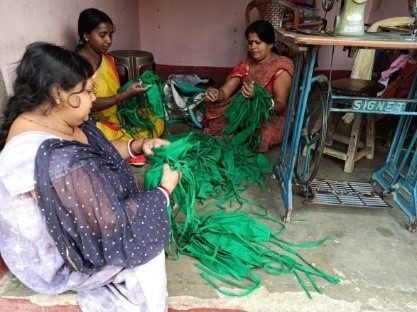 The other group, the “Samridhi Self-Help Group”, is made up of 20 women. The group is making fabric face covers with reusable and washable features. Since their beginnings, the two groups have made more than 4,000 face covers. The CSEI plans to help set-up more groups to sew and sell masks, providing women with income generating opportunities and offering face masks for the public at a reasonable price.
The other group, the “Samridhi Self-Help Group”, is made up of 20 women. The group is making fabric face covers with reusable and washable features. Since their beginnings, the two groups have made more than 4,000 face covers. The CSEI plans to help set-up more groups to sew and sell masks, providing women with income generating opportunities and offering face masks for the public at a reasonable price.
Support this Ministry
To make a gift for this ministry online or by check use the online donation page.
- 100% of your gift will be directed to CSEI’s Promoting Social Equity and Inclusion for Youth in India
- You will receive updates on the work in this area as they become available
- Share in the vision of God’s abundant life for all people
Related Content
Join us for a special opportunity to hear from Partner-in-Residence Dr. Nibedita Pramanik
Register now for the Global Ministries webinar with Partner-in-Residence Dr. Nibedita...
Read MoreIn Solidarity with the Montagnard Community of Vietnam
In the heart of Vietnam's Central Highlands, the rhythm of life for the Montagnard people was...
Read MorePrayers for Bangladesh Amid Political and Social Upheaval
Bangladesh is facing unexpected and unprecedented challenges and uncertainty about its future....
Read More
